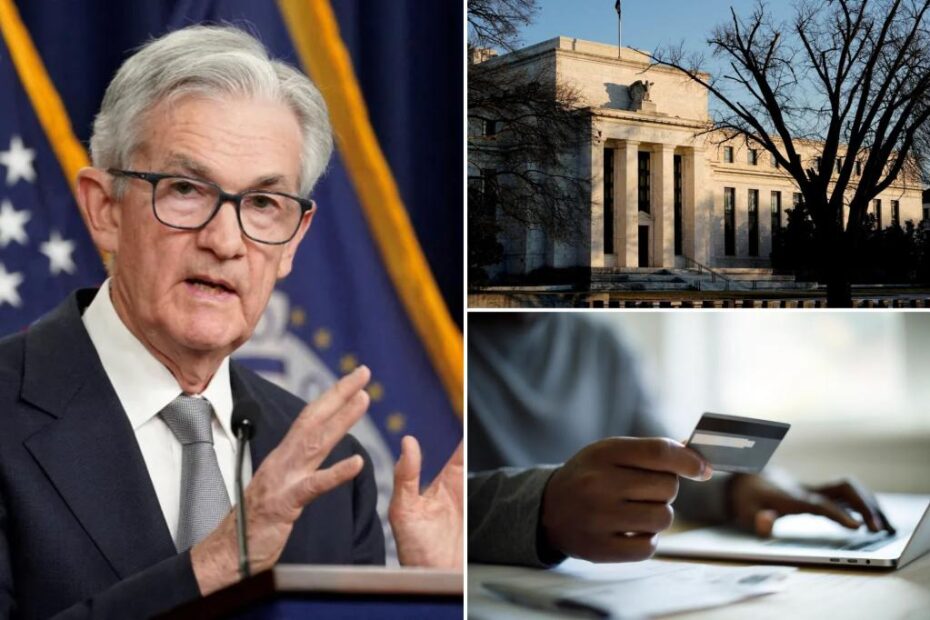[ad_1]
The Federal Reserve left interest rates unchanged on Wednesday — and gave no indication of it will lower them in coming months in a policy statement that tempered inflation concerns with other risks to the economy.
The central bank’s latest statement said the policy-setting Federal Open Market Committee “does not expect it will be appropriate to reduce the target range until it has gained greater confidence that inflation is moving sustainably toward 2%,” the Fed’s inflation target.
“Inflation has eased over the past year, but remains elevated,” the Fed said in the statement after a two-day meeting, restating that officials “remain highly attentive to inflation risks.”
The language will be a blow to investors who have been expecting rate cuts to start as early as March.
The Fed fund rate remains between 5.25% and 5.5% — the higbest in more than two decades.
Ahead of the Fed’s decision on Wednesday, US stocks were mixed. The Dow Jones Industrial Average was up less than 1% while the S%P 500 and tech-heavy Nasdaq were down roughly 1%.
Fed Chair Jerome Powell has suggested that there will be as many as three interest rate cuts in 2024, slashing borrowing rates by as much as three-quarters of a percentage point.
Any rate cuts would come as a relief to Americans, who have increasingly defaulted on their credit card payments as they’ve been squeezed by the economy.
Outstanding credit card balances surpassed $5 trillion for the first time in more than a decade, and all stages of credit card delinquencies — 30, 60 and 90 days past due — are higher than in 2019, according to a Philadelphia Federal Reserve report.
The rate for credit card holders who were 30 days late was 3.19%, up from 2.76% the previous quarter, the Philly Fed researchers found.
Those who hadn’t paid in 60 days or more spiked to 2.21% from 1.91%, and serious delinquency of three months or more rose to 1.52% from 1.32%, according to the data.
Though Powell has remained vague on the Fed’s timeline for the cuts, analysts have projected that Americans could get some relief as early as March — though the latest inflation reading, which came in a hotter-than-expected 3.4% in December, dampened that timeline.
January’s Consumer Price Index, which tracks changes in the costs of everyday goods and services, is set to be released on Feb. 13.
The reading — which remains stubbornly-above the Fed’s 2% target — came after the economy added a surprisingly-strong 216,000 jobs in December as annual wage growth picked up.
Though it’s good news the US labor market has defied odds in the face of inflation, such large payroll gains mean the Fed’s efforts for an economic slowdown have been unsuccessful.
“They’ll need to see some signs that the economy is slowing,” New York Fed President William Dudley told Bloomberg earlier this month.
“The wage trend for now is something that is likely concerning to policymakers,” he added, noting that the first of the Fed’s three projected rate cuts is more likely to take place in May.
Meanwhile, persistently high inflation poses a threat to President Joe Biden’s prospects for reelection later this year. Frustration over the rising cost of living has weighed on Biden’s popularity, even as other aspects of the economy have remained favorable.
On Tuesday, hedge fund billionaire Ken Griffin warned about the growing fiscal deficit, which ballooned to $1.7 trillion at the end of 2023 and is a risk that several business leaders have ranked as one of their chief concerns about the economy.
“We are still engaged in a reckless level of federal spending. That is creating a very different backdrop for the economy than any point in prior history,” Griffin said at the Managed Funds Association Network conference in Miami.
In the wide-ranging interview, Griffin also attacked the perceived anti-business stance of President Biden’s administration.
“This administration seems to be very focused on regulations that reduce the access to public market capital…. or make it more expensive to run a business,” added Griffin, one of the nation’s largest hedge funds that recently revealed plans to give back $7 billion of profits to its investors after a year of double-digit returns.
